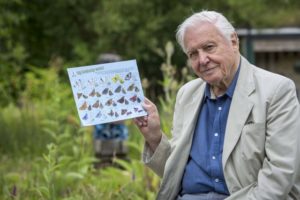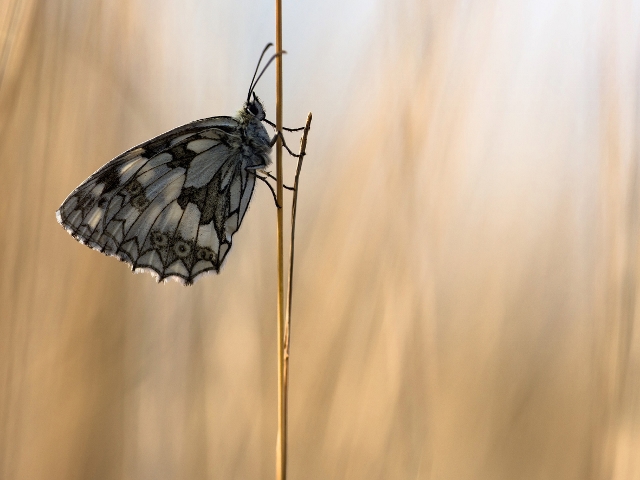Sir David Attenborough calls on West Midlands to help Big Butterfly Count.
Sir David Attenborough has spoken of the mental health benefits of watching butterflies as he urged people across the West Midlands to take part in the world’s biggest butterfly survey over the next three weeks.
The UK’s butterflies are basking in the best summer conditions for more than a decade, with hot sunny weather enabling widespread species to fly, feed and breed.
The Big Butterfly Count launched on Wednesday and Butterfly Conservation President Sir David said that taking part not only generates important data on butterflies, but also provides participants with precious time out from the stresses of life.
Research has indicated that spending time in nature, for example watching wildlife, can have positive benefits for mental health and wellbeing. Sir David explained: “I have been privileged to have witnessed some truly breath-taking wildlife spectacles in far-flung locations but some of my most memorable experiences have happened when I’ve been simply sitting and watching the wildlife that lives where I do.

Sir David Attenborough launches the Big Butterfly Count 2017.
“A few precious moments spent watching a stunning Red Admiral or Peacock butterfly feeding amongst the flowers in my garden never fails to bring me great pleasure. Spending time with nature offers us all precious breathing space away from the stresses and strains of modern life, it enables us to experience joy and wonder, to slow down and to appreciate the wildlife that lives side-by-side with us.”
Butterfly Conservation is being supported by mental health charity Mind to champion the benefits of spending time in nature.
Stephen Buckley, Head of Information at Mind, said: “We’re delighted to see that Butterfly Conservation is promoting the mental health benefits of getting outdoors. At Mind, we have found that being in nature can have a powerful, grounding effect, with research indicating that it can help alleviate mental health problems like depression and anxiety.
“The Big Butterfly Count is a wonderful way of interacting with the environment so we really welcome the project and would encourage people to look at the tips and ideas on our website for even more ways to bring nature into our lives.”
The UK’s Big Butterfly Count is the world’s largest butterfly survey, which encourages people to spot and record 17 species of common butterflies and two day-flying moths during three weeks of high summer. People are encouraged to take part at home in their gardens, in a nearby park or while out walking the dog.
In the West Midlands, there are also a number of events taking place where people can look for butterflies and do a Count, including a butterfly walk at Haugh Wood in Herefordshire on Saturday 21st July and a guided nature walk on Sunday 22nd July near Stoke-on-Trent.
Other events are taking place on Wednesday 1st August near Whitchurch in Shropshire, on Tuesday 31st July at Wigmore Rolls near Herefordshire, at the Shropshire Hills Discovery Centre in Craven Arms on Sunday 5th August and at Bury Ditches in Shropshire on Sunday 12th August.
Big Butterfly Counts will also be held at the Burwarton Show in Shropshire on Thursday 2n d August and the Far Forest Show in Worcestershire on Saturday 11th and Sunday 12th August.
Information on all of these events can be found at www.butterfly-conservation.org/WestMidlandsCountevents.
Sir David added: “A cause for great concern over recent years is that many of our once common and widespread species like the Large White, Small Copper and Gatekeeper have started to struggle, mirroring the declines of rarer species. Butterfly Conservation has also revealed that butterflies are declining faster in our towns and cities than in the countryside.
“So please take part in the Big Butterfly Count this summer, we need to know now, more than ever before just what is happening to butterflies in our towns, in our gardens and in our countryside. Your records can help us gather vital information that may help protect them in the future. Get out for the Big Butterfly Count, it’s good for them and it’s good for you.”
The Count runs from 20 July to 12 August. Taking part in the Count is easy – find a sunny spot anywhere in the UK and spend ffiteen minutes counting the butterflies you see and then submit sightings online at www.bigbutterflycount.org or via the free Big Butterfly Count app.
